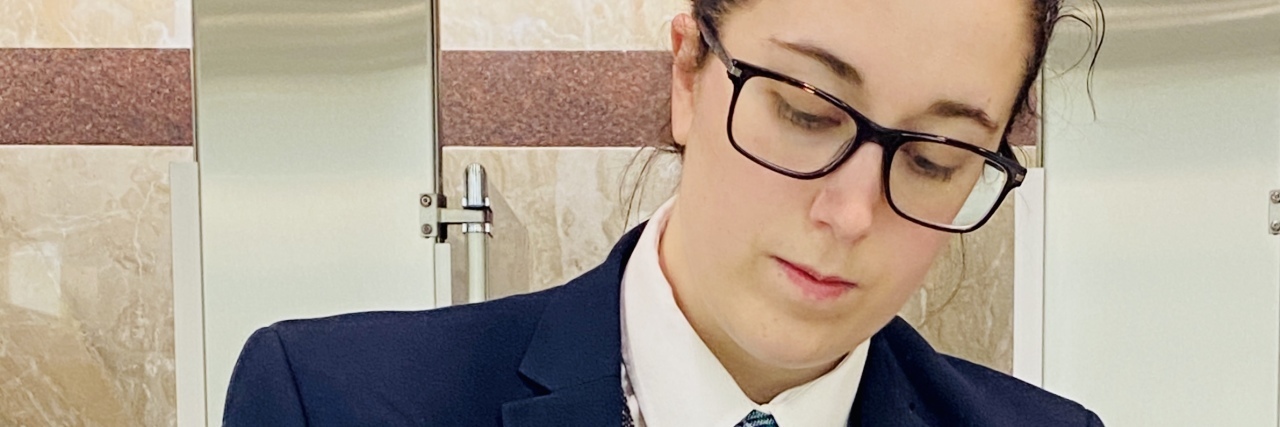“I just want things to be normal. I wish I was normal.”
• What is Ehlers-Danlos Syndrome?
• What Are Common Ehlers-Danlos Syndrome Symptoms?
This was my internal monologue through many of my pre-teen and adolescent years. Some days I’ll still get flashes of hope that perhaps one day my life could return to some sense of average-ness. This is, of course, impossible, as I have Ehlers Danlos syndrome, type 3, postural orthostatic tachycardia syndrome or POTS, as well as a few comorbid mental illnesses. Besides the various medical anomalies, I have come to recognize that from the moment of my birth, absolutely nothing has been or will ever be “normal.”
My parents knew I would be different, though I believe they mostly banked on my personality being odd more than anything else. From a young age, I was drawn to things declared “tomboy”-related like playing with sticks and fake swords outdoors, made friends with elderly folks in the neighborhood rather than children my own age, and was unafraid to capture frogs, caterpillars, moths, June bugs, and whatever else I could find and keep overnight for “observation” in my homemade basement “laboratory.”
My mother started me on the path on which many girls begin by enrolling me in ballet. I soon dropped out due to lack of coordination and considerable bullying, thus beginning years of trying my hand at almost every sport as well as tap dancing, Irish step dancing, and even ballroom dancing classes taught in a cotillion style. Eventually, I settled on musical performance, which I took to like a duck to water; I now play over 10 instruments and most with high-level proficiency.
Our family life was out of the ordinary to the world, but less so to our social circle since most everyone in our rural corner of southwest Virginia homeschooled their children, strongly encouraged their participation in a questionable sexual purity-focused Bible study and attended some kind of Baptist or Presbyterian church every Sunday and Wednesday. I attended these events and was often reminded by my mother to dress and act femininely as that “pleased God” for women and girls and would keep me in appropriate social standing with the rest of my peers. It appeared to come easily for everyone else — the flowy skirt-wearing, the delicate airs, straight-back posturing and genteel laughs.
For my part, I felt like a penguin among swans with my boyish swagger, big smile, casual presentation and loud belly laughs that seemed to hit the ceiling and hit me in the face with embarrassment if anyone heard me. As for the dresses and skirts, I was extraordinarily uncomfortable. From the perspective of my parents, they were no doubt confused as well as distraught that I couldn’t seem to be just like everyone else.
The lack of normalcy didn’t stop there, as shortly after graduating out of our little homeschool group we moved, and I was shortly afterward diagnosed with Ehlers Danlos Syndrome. Other diagnoses would follow shortly afterward. I spent years pursuing a diagnosis that inevitably landed me at the Mayo Clinic of Jacksonville, and began familiarizing myself with a variety of mobility aids including a manual wheelchair.
Besides the awkwardness of establishing a brand-new social life as a disadvantaged individual with a condition no one had ever heard of, I began gravitating in personal style toward blazers, button-ups and ties after seeing Julie Andrews in “Victor/Victoria.” After all, if it was good enough for the Queen of Genovia, it was good enough for me. At first, it was welcomed, but my newfound, more-comfortable and anything-but-feminine style was soon met with great consternation by my parents, who asked questions like, “Why can’t you look more feminine? Put some earrings in so you’ll be prettier. Why do you always dress so frumpy and look like a guy?”
I was finally comfortable. Was that so wrong? I couldn’t seem to convince anyone that I was truly more comfortable dressing this way, and quickly realized the one thing I desperately wanted to share with my parents would be anything but a welcome conversation — yet one more part of myself outside the box of normalcy.
Some years later while on a study abroad trip, I had a moment of reckoning. What exactly is normal? Is it worth being like everyone else and what they expect of you, or is it a better choice to instead live pursuing real things that matter, especially with the illness I have? As soon as I came back from my trip, I began approaching life completely differently — and what a profound difference it’s made.
I finally became proud to be a proud butch lesbian journalism grad school student with Ehlers Danlos syndrome, POTS, and a handful of mental illnesses. My mother passed away in early 2019, during which time an individual my father worked with outed me to him based on a photo they saw of my girlfriend and I on a social media platform.
My father refused to accept a daughter so comfortable in her identity, which has therefore manifested in a complicated relationship — something I believe many LGBTQ+ people have experienced in some capacity or another. Ehlers Danlos syndrome, type 3 is a responsibility and an identity I didn’t choose much like I didn’t choose to be gay.
What I chose instead was to embrace the parts of me I knew others would prefer I didn’t have, and decide to live with my heart and eyes wide open in pursuit of the things that really matter. On top of all this, I have an incredibly supportive partner who is there to help me stand on the days where I literally can’t, as well as get me ice packs, water and escort me to the chiropractor on my worst pain and brain fog days.
Normal will never be possible for me, and I’m more than OK with that.

